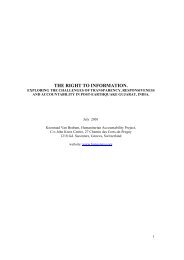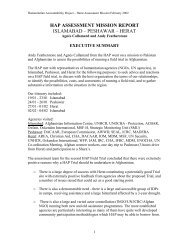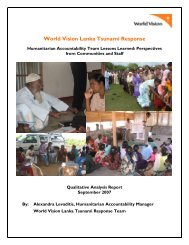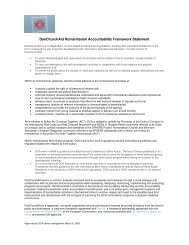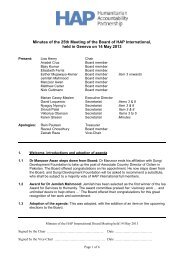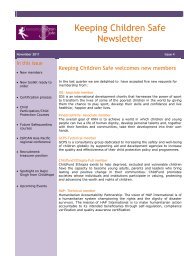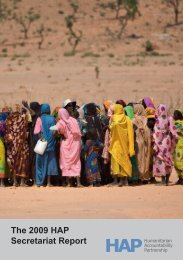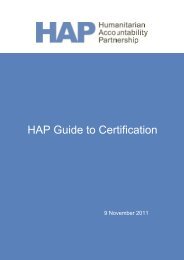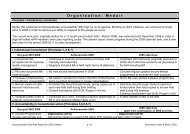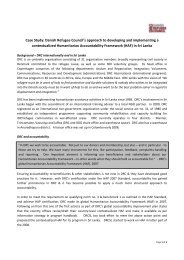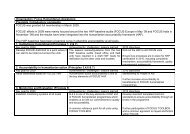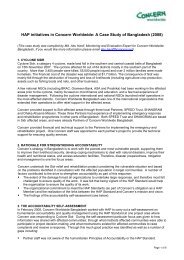Chapter Four - HAP International
Chapter Four - HAP International
Chapter Four - HAP International
You also want an ePaper? Increase the reach of your titles
YUMPU automatically turns print PDFs into web optimized ePapers that Google loves.
THE 2008 HUMANITARIAN ACCOUNTABILITY REPORT<br />
17. Save the Children UK<br />
Introductory comments: In 2008 Save the Children has worked towards:<br />
(a) strengthening understanding of accountability to beneficiaries in various levels of the agency;<br />
(b) building national level capacity in accountability to beneficiaries in several of 2008 programmes as permitted by the external and internal context;<br />
(c) integrating the concept of accountability to beneficiaries beyond humanitarian projects, to initiate a wider discussions across different departments<br />
of SCUK, as well as the Alliance through different agency-specific and interagency reviews, meetings;<br />
(d) standardizing M&E especially for emergencies to enable meta analysis through evaluations and regular monitoring of outputs at a global level<br />
through regular monitoring and reporting of progress towards outputs.<br />
This year has been remarkable for us, especially in relation to the Nargis response, where in a span of 10 months we achieved tangible results in building<br />
capacities, systems and experiences to ensure accountability to beneficiaries. We have tested and established different feedback mechanisms, and learned<br />
from our experiences by changing the programme focus to meet the needs of those affected by Nargis. We have made efforts to institutionalise learning<br />
from this experience, and have openly shared it with peer agencies.<br />
In 2008, we participated in different reviews that have looked at practices and experiences in accountability to beneficiaries, such as the SCHR Peer Review<br />
with CARE and ICRC in Haiti and Ivory Cost, as well as at the headquarters of peer agencies. As a DEC member agency, we went through a DEC<br />
Accountability Assessment. Based on findings from these reviews, we are strengthening accountability to beneficiaries in our preparedness and capacity<br />
building work.<br />
We have engaged the organisation, as well as other Save the Children Alliance Members in discussions on programme quality and accountability. We build<br />
upon our best practice and we recognise that there is more work to be done. We are entering the new year of 2009, prioritising on capacity building and<br />
streamlining accountability to our stakeholders in the way we work.<br />
Key goal for 2008 Achievements / challenges / lessons learned 2009 objectives<br />
1. Institutional Commitment (Principles 1, 2 & 7)<br />
Understand accountability within the existing<br />
structures, systems and procedures:<br />
• Produce a first draft of a public Humanitarian<br />
Accountability Framework (HAF) with input<br />
from Head Office Emergencies Section, policy<br />
teams and country offices.<br />
• Select a region for further review and capacity<br />
building.<br />
• build in-house capacity within Emergencies<br />
Section Advisers and selected region country<br />
programme/s and with partners for improving<br />
accountability and operationalise HAF<br />
Achievements:<br />
• A policy discussion has been initiated, guided by a<br />
draft position paper outlining accountability to children.<br />
• We have used and tested the DEC accountability<br />
Framework in programme contexts together with<br />
the <strong>HAP</strong> standard to establish best practice. Our<br />
learning from Myanmar, Zimbabwe and other<br />
projects is being documented, and a formal review<br />
will analyse the learning component in 2009 April.<br />
• We have had multiple discussions on programme<br />
quality and accountability and have prioritized it as<br />
an area we are committed to improve in our<br />
strategy review.<br />
• Extend discussions on humanitarian<br />
accountability across different Alliance<br />
members, especially through M&E<br />
harmonisation processes.<br />
• Produce a “good enough” draft of<br />
humanitarian accountability commitments in<br />
project management cycle; look for one<br />
opportunity to test it.<br />
• Prepare a plan of action in relation with<br />
further operationalisation of the Humanitarian<br />
Accountability Commitments.<br />
108<br />
133




